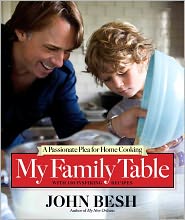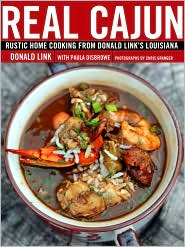Cajun Country Categories:
 Cajun Home
Cajun Home
 Acadiana
Acadiana
 Art
Art
 Music
Music
 New Orleans Links
New Orleans Links
 Recipes
Recipes
 N.O. Restaurants
N.O. Restaurants
La Belle Cuisine
Recipe of the
Day Categories:
 Recipe Home Recipe Home
 Recipe Index
Recipe Index
 Recipe Search
Recipe Search
 Appetizers Appetizers
 Beef Beef
 Beverage
Beverage
 Bread Bread
 Breakfast Breakfast
 Cake Cake
 Chocolate Chocolate
 Cookies Cookies
 Fish Fish
 Fruit Fruit
 Main Dish
Main Dish
 Pasta Pasta
 Pies Pies
 Pork Pork
 Poultry Poultry
 Salad Salad
 Seafood Seafood
 Side Dish Side Dish
 Soup Soup
 Vegetable Vegetable
 Surprise! Surprise!

Have a heart for
New Orleans

 Zydeco with
Zydeco with
Warren Prejean
Photographic Print
Millsap, Diane
Buy at AllPosters.com

 Pirates Alley By Night
Pirates Alley By Night
Giclee Print
Millsap, Diane
Buy at AllPosters.com
Love New Orleans?
This book's for you!
 
My New Orleans:
The Cookbook
 
My Family Table:
A Passionate Plea
for Home Cooking
 
Real Cajun: Rustic Home Cooking from Donald Link's Louisiana


The Cajun
Giclee Print
Newcomb, John
Buy at AllPosters.com
Expanded Edition - 25
delicious new recipes!
 
Tom Fitzmorris's New Orleans Food: More Than 250 of the
City's Best Recipes
to Cook at Home
|
|
Your
patronage of our affiliate
partners supports this web site.
We thank you! In other words, please shop at LBC
Gift Galerie!
Have a heart!


Cajun Band
Giclee Print
Newcomb, John
Buy at AllPosters.com
Click for
New Orleans Red Beans & Rice!
What's the difference between Cajun and Creole ? ?
...and the difference between
Cajun and Creole cooking
s'il
vous plait??
Here (in part) is what esteemed restaurant critic,
writer and publisher
Tom Fitzmorris has to say on this controversial subject:
CREOLE OR CAJUN? IS THERE REALLY A DIFFERENCE?
"If you want to spark an argument among old-time gourmets, ask
them to tell you the difference between Creole and Cajun cooking.
It'll
be entertaining.
Don't bother paying much attention to what exactly they say,
though. For a controversy that's carried on as long as it has with so
much heat, it's delivered almost nothing either useful or interesting.
Still, it rages on, and you see the topic addressed in almost every
book written about Louisiana food, and every conference. At the Cooks
& Books part of the Tennessee Williams Festival a few weeks ago, for
example, the highest local authorities were gassing out on this matter
yet again. Every editor I've ever written for has insisted that I weigh in
on
Creole versus Cajun.
So I guess we need to drag it out here every now and then.
Here's my outlook. Cajun and Creole are the opposite ends of the
distinctive South Louisiana cuisine. It changes subtly as you drive from
Ville Platte to New Orleans. You'd find the same culinary differences
between
any two points at an equal distance apart in France or Italy or
China or India
or any other place with a powerful food culture.
Creole and Cajun are much more alike than they are like anything
else...
...But you do see oysters Rockefeller in Lafayette, and crawfish
etouffee in New Orleans. There's been so much cross-fertilization of
the
styles
over the decades that the merger has been consummated.
I say, stop thinking about it. Just eat it."
Index - New Orleans Recipes!
Chicken Pontalba is one of those dishes that has become
a New Orleans
legend, even though you do not see it around much these days.
It is on the
short list of my childhood favorites. I remember it
distinctly, and quite
fondly. Therefore I was doubly pleased to find that
Tom Fitzmorris has
named it No. 10 on
his list of…
The One Hundred Best
Restaurant Dishes
in New Orleans
”I've been counting them down, one per day. I'd still like to hear
your
nominations, in case I forgot a good one. These are the dishes I'd
instantly think about ordering in the restaurants where they're served.
Most of them are menu items you can count on finding, rather than
specials.
The list started with over 200 great dishes, so this is quite an
all-star
lineup.”
Number 10
Chicken Pontalba
Palace Cafe
605 Canal, 523-1661
"Chicken Pontalba was created at Brennan's a long time ago, but even the
Brennans look upon it as an almost hopelessly antiquated dish. Which it
probably is. That, however, takes nothing away from its goodness.
What we have here is a half-chicken (or perhaps just a breast) that's been
broiled or baked. It's covered with a combination of ham, mushrooms, and
potatoes, all sautéed in butter. Over the top of it all is béarnaise sauce.
Chicken Pontalba reached a peak some years ago when the Palace Café had
rotisseries for the chickens. But it's still wonderful there, even though
they
only offer it on their weekend brunches.
One other restaurant serves excellent Chicken Pontalba with some frequency:
Brigtsen's. But, like everything else there, it's here today, gone
tomorrow."
~*~*~*~*~*~*~*~*~*~*~*~*~*~*~*
All things considered, I simply
could not believe that Chicken Pontalba was
not included in LBCs vast
archives of
famous New Orleans restaurant recipes.
Mea culpa. Terrible oversight,
apparently, but one that is easily remedied.
Here is the evolution, as best
we can present it to you - from Brennan’s to Commander’s Palace. No doubt
Dickie Brennan's Palace Cafe has added
a distinctive touch of their own.
Chicken Pontalba
Brennan's New Orleans Cookbook

Edited and Illustrated by Deirdre Stanforth
© 1961, 1964 Brennan’s Restaurant and Hermann B. Deutsch,
Robert L. Crager &
Co. Publishers
1982, Pelican Publishing Co., Inc,
 
1/2 cup butter
1/2 cup thinly sliced white onion
1/4 cup chopped shallots
1 tablespoon minced garlic
1/2 cup chopped mushrooms
1/2 cup chopped ham
1 cup diced potato, deep-fried light brown and
drained on absorbent paper
1/2 cup white wine
1 tablespoon chopped parsley
2 pounds chicken leg, thigh and breast (boned)
1 1/2 cups Béarnaise Sauce
In a 10-inch skillet melt butter and sauté onion, shallots
and garlic until tender. Add mushrooms, ham and potatoes and continue
cooking about
5 minutes more. Add wine and parsley, heat through. Remove
sauce
from heat, keep warm. Dredge boned chicken pieces in seasoned flour
and fry golden brown. To serve, arrange chicken pieces on bed of above
sauce
and cover chicken with Béarnaise Sauce. Flank with warm toast
triangles and
sprinkle lightly with paprika. 2 to 3 servings.
Chicken Pontalba
The Commander's Palace
New Orleans Cookbook

By Ella and Dick Brennan,
© 1984 by Commander’s Palace, Inc.
 
Serves 4
“Created by
Chef Paul Blangé in the early days of Brennan’s, this dish was
named after
the beautiful Baroness Pontalba, who came to New Orleans
in the 1700s.
Boneless breast of baked chicken is presented on a bed of
seasoned
vegetables mixed with crisp fried potatoes and ham, all topped
with a rich,
buttery béarnaise. The vegetable-ham base also makes an
excellent filling
for an omelet topped
with béarnaise.”
10 tablespoons (1 1/2 sticks) unsalted butter
2 whole chicken breasts, halved and boned
8 cloves of garlic, minced
2 cups diced boiled ham
12 fresh mushrooms, diced
16 green onion tops, coarsely chopped
2 teaspoons Creole Meat Seasoning *
1/4 cup dry white wine
2 cups finely diced potatoes
Oil for frying
8 tablespoons Béarnaise Sauce (recipe follows)
* Creole Meat Seasoning:
Combine 1 cup salt, 3/4 cup granulated or powdered garlic, 3/4 cup freshly
ground black pepper, 1/2 teaspoon cayenne pepper or to taste, and 1/4 cup
paprika; mix thoroughly. Pour into a large glass jar. Seal tightly. Keeps
indefinitely.
1. Preheat oven to 400 degrees F.
2. Melt 2 tablespoons butter in a shallow baking pan. Dip chicken breasts
in
butter, coating them on all sides, arrange in the pan, and bake until
tender
and lightly browned, 10 to 15 minutes. Set aside and keep warm
until ready
to serve.
3. Heat remaining butter in a sauté pan and sauté garlic, ham, mush-
rooms,
green onions, and meat seasoning until vegetables are slightly
cooked. Add
wine and simmer gently to slightly reduce the quantity
of the sauce.
4. Meanwhile, fry the diced potatoes in oil heated to 365 degrees F.
Remove
with a slotted spoon when potatoes are golden and crisp
and drain on paper
towel.
5. To serve: Add the fried potatoes to the vegetable-wine mixture and
toss
lightly. Put a spoonful on each plate and top with half a chicken
breast.
Top each portion with 2 tablespoons béarnaise sauce and
serve immediately.
Béarnaise Sauce
Makes
2 1/2 cups
1/2 pound (2 sticks) unsalted butter
4 egg yolks, at room temperature
Juice of 1 medium lemon
1 1/2 teaspoons Worcestershire sauce
Pinch of cayenne pepper
3 tablespoons Chablis or dry vermouth
Salt to taste
2 teaspoons finely crumbled dried tarragon leaves
1. Melt butter in a skillet over medium heat. Do not let it
burn. When completely melted, remove from heat.
2. Put egg yolks, lemon juice, Worcestershire sauce, and cayenne pepper
in
top of double boiler over simmering water. The water in the bottom
pan
should not touch the top pan.
3. With a wire whisk, beat egg yolk mixture until it thickens and a sheen
forms, approximately 3 minutes, but no more than 5. Begin adding
melted
butter in a steady stream, whisking constantly until all has
been added. Add
2 tablespoons of the Chablis and whisk well. The
sauce should be light and
fluffy.
4. In a small saucepan, heat the remaining [1 tablespoon] Chablis and
the
tarragon until liquid evaporates. Remove from heat and add the
tarragon to
the sauce, mixing well. Hold at room temperature until
serving time.
 Cajun Pot Au Feu
Cajun Pot Au Feu
Tom Fitzmorris
"When Gunter and Evelyn Preuss took over Broussard's, they were still
running the Versailles and wanted to keep the two menus distinct. The
Versailles was famous for its bouillabaisse, and Chef Gunter wanted
something like that at Broussard's, too--but different. This is what they
came up with. It was great, but not there any more: the chef's bouillabaisse
has taken its place. This is easier to make. And cheaper--no saffron."
1 stick butter
4 medium carrots, coarsely chopped
2 onions, coarsely chopped
2 leeks, white parts only, well washed
and chopped coarsely
6 ribs celery, coarsely chopped
2 Tbs. tomato paste
1/4 cup brandy
2 cups white wine
3 fresh, ripe, peeled, seeded tomatoes
1/2 tsp. chopped garlic
3 quarts chicken stock
3 Tbs. butter
1 lb. shrimp, peeled and deveined
1 lb. fish fillets (redfish, trout,
sheepshead, drum, etc.)
2 dozen oysters
1 lb. lump crabmeat
1/4 cup chopped fresh parsley
1. In a large saucepan, heat the stick of
butter until it bubbles. Sauté
the carrots, onions, leeks and celery in the
butter until they turn limp.
2. Stir in the tomato paste, then pour in
the brandy. Carefully flame
the brandy and allow the flame to extinguish
itself.
3. Pour in the white wine and bring it to a
boil. Reduce by about
one-fourth, then add the tomatoes and garlic. Return
to a boil, cook
for about a minute more, and add the chicken stock. Bring to
a boil
and cook for about 15 minutes.
4. Meanwhile, heat the 3 Tbs. butter in a
skillet and, in turn, sauté the shrimp, fish, and oysters. The shrimp should
turn pink, the fish should
turn opaque, and the edges of the oysters should
curl. Do not overcook.
5. Add the shrimp, fish, oysters, crabmeat, and parsley to the soup and
bring to a boil. Season to taste with salt, pepper, and Tabasco sauce.
This
dish can be served as is, with rice, or with pasta. The consistency
should
be like that of gumbo.
Serves four entrees generously.
Do you know what it means
to miss New Orleans?
Party Central!
Daily Recipe Index
Recipe Archives Index
Recipe Search
|











